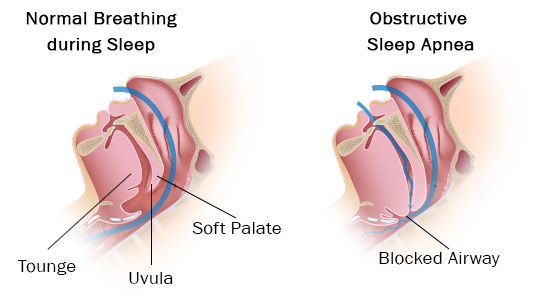
Sleep apnoea is a disorder which is characterized by abnormal pauses in breathing (apnoeas) or abnormally low breathing (hypopnoeas) during sleep. These apnoeas can occur due to a lack of respiratory effort, due to a physical blockage to airflow, or a combination of both. Obstructive Sleep Apnoea (OSA) is the most common type of apnoea and occurs where there is a physical blockage of airflow.
Individuals with OSA are rarely aware of having difficulty breathing. In fact, the problem is often recognised by the person’s bed partner or someone who sleeps in the same room. Patients suffering from OSA often feel fatigued during the day and report daytime sleepiness, which they often become used to. It is not unusual for a patient with sleep apneoa to take naps during the day, fall asleep watching television or sitting in a car or fall asleep while talking to someone. Sleep apneoa can also affect your work performance, vigilance, motivation and other behavioural or cognitive effects.

Snoring, on the other hand, is caused by vibration of respiratory structures due to obstructed air movement during breathing while sleeping. This is often caused by the uvula (the tissue that hangs down in the back of your throat), an elongated soft palate, a large tongue or obstructions in the nasal area.
While for some snoring is not a concern, there is a percentage of the population that suffer night after night. Snoring and OSA can have an immense impact on the sufferer, their partner and their family, including;
- Stress
- Daytime sleepiness
- Motivational issues
- Increased risk of mental health concerns
- Increased blood pressure
- Increased risk of diabetes
- Heightened chance of cardiovascular disease
With approximately 1.5 million OSA sufferers in the UK, there are an estimated 85% that are undiagnosed. Sedentary lifestyles and greater levels of obesity suggest that, sadly, numbers are only likely to increase.
If you suspect you might be suffering from this debilitating condition, do not hesitate to make an appointment with the doctor.
Call Medcare on 966 860 258 or email doctors@medcarespain.com
